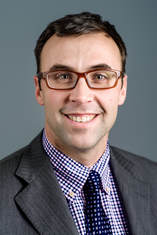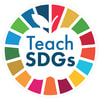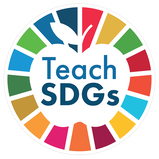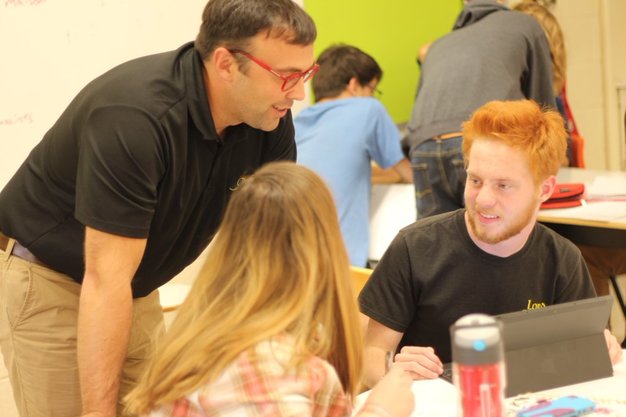|
By Armand Doucet, #TeachSDGs & ADE Ambassador Collaborative efforts across the spectrum of the United Nations Sustainable Development Goals (SDG) and students in K-12 schools is necessary for the goals to be reached by 2030. This article highlights an interdisciplinary, cross partnership (government, non-profit and private sector) collaboration from secondary school that began in a World Issues classroom. The teacher, Armand Doucet, invites students to delve into areas about which they are passionate and create a Startup company with colleagues that tries to find solutions to one of the SDGs. Ethan and Leif are two students that are separately passionate about health sciences and the environment. Armand’s writing (in italics below) will introduce the context and the background with regards to Passion Projects Start-ups. In what follows, Ethan and Leif share on their experiences. Armand: My goal as a teacher in the classroom is to develop skills intertwined with curriculum content. Social and Emotional Learning (SEL) and 21st century skills need to be developed not haphazardly, but purposefully. For this to happen, the culture and design of my classroom and how I approach curriculum outcomes and standards and skills development must combine with a growth mindset (Carol Dweck) and design thinking process (IDEO-Tim Brown). I try to foster and develop divergent thinking (Sir Ken Robinson) in students who will embrace the problems of the world instead of fearing them because in reality: “The world doesn’t care what you know. What the world cares about is what do you do with it" (Tony Wagner). So, I believe that connecting the curriculum to what the students are passionate about is a great way to develop my classroom. With Passion Projects Start-ups students realize the joys of learning again by following their own path and trying to solve real world issues. As you can see in Ethan and Leif’s statements below, when allowed to pursue their own goals in education, students struggle at first. I try to let them explore, discover, and create their own networks. I become an advisor they meet once a week to help them continue to develop their ideas and pitch. As they embrace the core problem of their Passion Projects, resiliency precedes enthusiasm and then enthusiasm leads to pride as students create and subsequently work to bring solutions to the SDGs. They play an important part in the future sustainability of our communities and get the opportunity to start in my classroom. The experience is unique to each student and they build a network with people from around the world, solidifying ties to possible relationships that will impact our world for years to come. Tony Wagner (Creating Innovators) states “the most important thing is allowing students to ask questions and then give them the space to find the answers.” I believe my job as a teacher is to facilitate the development of skills for each student--personalizing the learning so they can each succeed in the future. You can visit my template for this type of classroom at www.lifelessonlearning.com. Please send any questions about the Passion Project Start-up for my World Issues class and how SDGs play a large part to my direct email at [email protected]. Ethan: My name is Ethan Fogarty and walking into Armand Doucet’s World Issues 120 class was not what I expected. It was like entering a parallel universe, where instead of the students asking the teacher the questions, the teacher asked the students the questions. It was a very cool experience, where Mr. D. acted as a mentor and guide to our learning, and our learning was in our own hands. Leif: My name is Leif Henrichs, and I realized in my World Issues class that the greatest global challenge was set upon us in 2015, with the hopes to build a better plan of sustainable action for citizens and the planet. Seventeen goals, ranging from abolishing worldwide hunger to gender equality, were given to us by the United Nations. These goals strive to be an indispensable requirement for sustainable development by the year 2030. Ethan: A large part of Mr. D’s class revolved around the United Nations' Sustainable Development Goals, more specifically a giant semester long Passion Project. A group of us decided to tackle malaria. My personal decision to follow this path was due to my overwhelming fascination with medicine. Medicine is my passion and my future career, and it was an amazing experience for my passion and future to coincide hand in hand with my current education. All the classes I take now are about sciences or English, and it is sad to think I have gone through 12 years of education without learning about my passion directly, and still have a few more before my passion becomes what I actually learn about. Mr. D.’s class was a different experience, where I learned both about the problems in our world as well as a fair deal about myself. The key is I now believe that I play an integral part in finding solution, and know I can change my community, country, and world. Leif: Early in the first semester of 2017, I walked into my French immersion World Issues class. My teacher set down a list of problems brought upon by the United Nations and told us as a class, to choose three different goals we would be interested in solving. I personally thought the problem of Life on Land was the most problematic for the development of humanity. The next day we were grouped by interest and were given the opportunity to identify what was the issue and the mandate to help find a solution. Real world learning by addressing a real world problem in class. As a group, we had the liberty to use anything and everything to work on this problem throughout the semester, and we were encouraged to think outside the box. Mr. Doucet enforced that the problem we found associated with the United Nations' Sustainable Development Goals were not just a class project, but a life project that we could work on in other classes and in everyday life. As a group we decide to focus on the problem of deforestation and I can tell you now that I have never worked harder at anything in my life. This project almost consumed me 24/7 because Mr. D made us believe that we could truly be the change. Ethan: One of the sustainable goals created by the UN is to end the endemic of malaria. We were introduced to these goals very early in the course and told to choose one. Naturally, I instantly narrowed the choice to the health and well-being goal. From there, malaria stood out to me, and luckily to a few others as well. Now, we had a team, but what next. Another way World Issues class was different was because a lot of class time was used to collaborate as a group to use the design process to prototype our solution. We were encouraged to reach out to experts from around the world and partner up with non-profits and people that were living in the conditions we were trying to help. Research for the project was largely done outside of class, but done willingly and without complaint. I remember thinking that this project felt more like a business or organization set out to help others than simply a project, which made it more real. I realized that we were creating a business and that this could be a lifetime project. It changed the atmosphere and attitude towards learning, where a regular project’s final destination is the trash can or a land fill, this project was potentially saving countless lives, which means keeping on top of work and taking initiative was both more important than another project and easier to be engaged in because we were empowered. Leif: We looked at every angle of the deforestation issue because it is important to have a complete perspective. Our group worked hard on researching the effects of clear cutting and tried to find the root cause of why we did this as people. We realized that is was mostly done to be able to do agriculture and mass produce coffee or something more lucrative. We believed that we wouldn’t be able to impact this one at a level that was acceptable to our group. So, we took up the second reason for deforestation which is forest fires. As our group hustled away, I was able to create an idea to speed up the succession rate of post forest fires accompanying the halt of erosion of post forest fires, and that’s just covering the two main solutions my idea entails. This project followed me through three different classes the rest of my grad year as well as two separate entrepreneurship events. I need to create an awareness campaign via a 3:00min commercial, a pitch and marketing campaign for venture capital, become an expert in my chosen field and prototype a solution. Ethan: By the end of the semester, we knew more about the subject of our choice than Mr. Doucet did, which I think is pretty special. Every other class I have ever taken, I have come out knowing less than the teacher; knowing bomb calorimetric, but unable to do it as quick as my chemistry teacher, knowing about the biology of plants while unable to go into as much depth on photosynthesis as my biology teacher. Mr. Doucet’s class was different. By the end of the semester, I had created a prototype of what I felt was a way to lower malaria rates in Africa, while having a more extensive knowledge on malaria and the specific problem than even my teacher. I was able to reach out and partner with experts from around the world, getting really good at asking the right questions to broaden my group’s knowledge base and understanding. However, in class, I was not the one asking the questions on my topics to Mr. D., but answering them; which I feel is a very beautiful moment in education. Leif: While my idea progressed throughout the year, I made different contacts and showcased my learning throughout my school, such as to my teachers and my peers. Also, I connected with my community by attending different events and competitions to spread awareness of the deforestation issue and present my 3D printed solution. I was able to secure some venture capital with this high school project making me now a true entrepreneur. I don’t believe this is end of the journey for the UN Sustainable Development Goals for me, and I as I graduate in a few weeks, I plan to keep working away on the problem of deforestation next year at Acadia University and keep engineering a solution. Hoping one day I will be able to make a difference in the world, as well as carrying out my true passion of life on land. Ethan: After my semester in Mr.Doucet’s World Issues class, I was too enthralled with the SDGs to simply move on, so I chose to continue working with them in my second semester of school. What goal I was going to choose this time remained a mystery to me, until one day I saw the latest Honey Nut Cheerios commercial about the bees dying off. This linked to the SDG of halting biodiversity loss, so I decided to embrace the challenge of saving our honey making friends. I could not do it on my own, so within my Science 12 class the team was created. "The Bee Team" to be exact; that is our official name. We are a non-profit business trying to save the bees using three different branches of intervention. We work with our town, local businesses, and even beekeepers to create bylaws on nicotine based pesticides within town limits, use a pollination plan to increase the beauty of the town, and share bee nutrition for local restaurants incorporating rooftop bee hives. Through Mr. Doucet’s class and his voluntary help, in the past year I have worked towards solving not only one, but two of the SDGs created by the UN. Creating a business from the ground up while keeping on top of my required school related work has been a challenge, but a challenge I gladly accept. When I first began this idea, I expected it to remain as a small scale project, largely from an idea I would pull up a metaphorical Mount Everest, but I have found an overwhelming amount of support from everyone. As of right now, the project remains local, but we have received some funding, and I am hoping that eventually it becomes worldwide in scale.  Armand Doucet is a globally recognized award-winning educator, leader, and business professional with a unique combination of entrepreneurial, teaching and Innovative projects. A sought after inspirational-speaker, author, columnist and blogger in multiple fields, Armand has contributed to CBC, Education Partners, BrainStem Sympoisum, STEM Educators Symposium, Atlantic Education Summit, #TeachSDGs and Tedx. He has led, and collaborated with, teams from around the world, an across different industries, to success in health, education, non-profit and business. Armand was the president and founder of the Ironwill Foundation and was also part of a team of teachers who brought Harry Potter to life at Riverview High School, connecting the school to over 1.8 million people worldwide. He is driven to make a difference in his students’ lives and wants every student to inspire, educate and empower others to reach their full potential. Recently, Armand founded Life Lesson Learning, which is working to change teaching worldwide by giving 21st century skills development its proper place in the classroom through his Passion projects initiative. Armand received the Prime Minister’s Award for Teaching Excellence 2015, is a Meritorious Service Medal Recipient Governor General of Canada, is an Apple Distinguished Educator and has just recently been nominated in the Top 50 for the Global Teacher Prize. He currently teaches Modern History at Riverview High School, in New Brunswick, Canada and is working on a children’s Picture book series to empower girls to believe that they can do STEAM jobs and find solutions to the UN sustainable goals. As always, Armand is inspired by his incredible wife, Nicole, and his two girls. You can connect with Armand on Twitter at @DoucetArmand. 7/23/2017 07:48:24 am
As a parent and a teacher, it has been quite an evolution in both Ethan and Leif from when they started Armand's classes in Grade 11 and finished with mine in Grade 12. It is fun doing a 1-2 punch. The humanities bleeding into the sciences and business. Thanks for all your work Armand.
Nathan Cameron
7/23/2017 07:53:55 am
Awesome work! It's amazing to see what students can do when you engage their passions and let them explore Comments are closed.
|
AuthorSTeachSDGs Team & Contributors Archives
November 2019
Categories |



 RSS Feed
RSS Feed